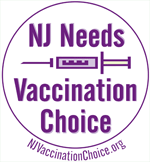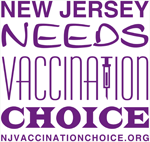Monday, February 7, 2011
BY LINDY WASHBURN
The Record
STAFF WRITER
 Last summer, New Jersey quietly made it easier for parents to get a religious exemption from the immunization requirements for children entering school or day care. Now a state legislator who’s also a doctor says that was a bad idea.
Last summer, New Jersey quietly made it easier for parents to get a religious exemption from the immunization requirements for children entering school or day care. Now a state legislator who’s also a doctor says that was a bad idea.
Assemblyman Herb Conaway Jr., D-Burlington, has called on the state health commissioner to withdraw the rule — or he says the Legislature will.
“The problem is, now you don’t have an immunization program that will work,” Conaway said. “Either it’s important to protect the public health and alleviate human suffering or it’s not.”
A health department spokeswoman says Conaway’s measure “is currently under review by the department.”
The health department’s new rule says that authorities can’t question parents who declare their objection to a vaccine to be religious, as long as their exemption request uses the word “religious” or “religion.”
But Conaway says that’s not consistent with state law, which says parents must explain how a vaccine conflicts with their religious beliefs. Without that stricter standard, he says, parents will use the exemption for other reasons.
The dispute reflects a growing, if scientifically debatable, concern about vaccine safety among parents. Some want to decide for themselves what shots, if any, their babies and young children should receive.
New Jersey has the highest incidence of autism in the nation, and some parents fear that vaccines may contribute to its development. They don’t trust assurances that vaccines are safe.
The number of children in New Jersey getting exemptions from vaccine requirements has been growing for years, even without the official rule change. It more than doubled in the five years ending in 2009, going from 1,644 in the 2005-06 school year to 3,865 children — or 0.8 percent of the student population. The biggest spike came in 2008-09, when the state added a flu shot to its list of required vaccines for preschoolers.
Children in schools and day care in Bergen County have a higher proportion of religious exemptions than the state as a whole — 1.1 percent, or 550 children in 2009-10, according to reports collected by the state health department. In Passaic County, the rate was lower, 175 pupils, or 0.5 percent.
Public health experts warn that more unimmunized children will mean once-devastating diseases will spread again — not only among those who choose to skip the vaccines, but among those who can’t be vaccinated, for whom the vaccine was ineffective, or for those who are more susceptible, such as people with compromised immune systems.
“People think of vaccines as seatbelts that protect us individually,” said Dr. Drew Harris, chairman of the New Jersey Public Health Institute. “But they’re more like stop signs and traffic lights that protect everyone else. … People need to look at the facts and recognize that the risks of not vaccinating are much greater than any theoretical risk of vaccinating.”
Parents in doubt
The state is trying to protect the public health, in a climate in which some parents openly question the scientific foundation of public-health policy.
“They’re picking and choosing the epidemiological studies,” to prove there’s no causal link between children’s vaccines and autism or other neurodevelopmental disorders, said Deirdre Imus. The wife of radio personality Don Imus and author of several books on green living, she founded an environmental center for children’s cancers at Hackensack University Medical Center.
“Most parents are not anti-vaccine,” she said. “I’m not. The center’s not. We’re calling for safe vaccines. … No parent wants their children to get any of these diseases. But we don’t want the trade-off to be that now they might have neurodevelopmental problems.”
Pediatricians on the front lines say they spend a lot of time assuaging parental concerns.
 “We’ve seen enough of what happens when children are not immunized,” said Dr. Jeffrey Bienstock of PediatriCare Associates in Fair Lawn and chairman of pediatrics at The Valley Hospital in Ridgewood. The practice refuses care to families who won’t vaccinate their children, he said.
“We’ve seen enough of what happens when children are not immunized,” said Dr. Jeffrey Bienstock of PediatriCare Associates in Fair Lawn and chairman of pediatrics at The Valley Hospital in Ridgewood. The practice refuses care to families who won’t vaccinate their children, he said.
This debate comes at a time when some of the most serious contagious diseases, including whooping cough, mumps and Haemophilus influenzae B, are making a comeback.
Over the past year, a whooping cough epidemic in California sickened thousands of people and caused the deaths of 10 babies; two Pennsylvania children died in an outbreak of Haemophilus influenzae B; and a mumps outbreak that began in a New York summer camp spread among tri-state members of the Orthodox Jewish community, including a child in Teaneck and several children in Monmouth County.
The percentage of New Jersey children vaccinated is well below the national average for measles, mumps and rubella, hepatitis B and others, according to the federal Centers for Disease Control and Prevention. The state ranked 42nd in a survey by the CDC of vaccination rates in 2009, and 45th in 2008.
“We know we dropped from being in the top 10 to being in the bottom 10,” says Dr. Margaret Fisher, a member of the infectious-diseases section of the American Academy of Pediatrics and chairwoman of the pediatrics department at Monmouth Medical Center. “We don’t know why. We know the exemptions have gone up dramatically, but that still doesn’t account for a huge percent of children who are not vaccinated.”
In an intriguing reversal, poor children whose shots are provided through public insurance plans nationwide are now more likely than children with private health insurance to be vaccinated.
New Jersey permits vaccine exemptions for medical and religious reasons. Parents aren’t required to be members of a particular religion, such as Christian Science, to be eligible for a religious exemption, and they don’t need a note from a religious official.
The state’s 1974 vaccine law allows a religious exemption when parents sign a written statement that the immunization “interferes with the free exercise of the pupil’s religious rights.”
In 2002, when a requirement for a hepatitis B vaccine was added, lawmakers said the written request had to explain how receiving the vaccine conflicted with “the bona fide religious tenets or practices” of the student or parents, and added that “a general philosophical or moral objection to the vaccination” wasn’t enough for a religious exemption.
But just in 2008, the health department sent legal guidance to school officials: They could not question a parent’s religious beliefs or commitment, as long as the request contained the words “religion” or “religious.” The clarification was codified as a rule during the Christie administration, becoming official last July.
Public health advocates say the new rule gives parents an easy out and will lead to fewer children being immunized.
Conaway believes parents should have to explain their situation. “You don’t have to come in with a letter from the pope. But you would have to make it clear that based on your understanding of your religion — that [vaccination] interfered with religious practice,” he said.
Parental-choice advocates say the state cannot be permitted to determine which religions qualify or which parents are genuine members of such religions. “It’s a slippery slope, who is qualified to make that judgment as to what that person’s relationship is with their god,” said Maureen Drummond, co-founder and co-director of the New Jersey Coalition for Vaccination Choice.
For parents who don’t want their child to receive a vaccine, “religious exemption is the only viable exemption in the state at this point,” she added.
Testimony ran unanimously in favor of reversing the new rule at a January Assembly committee hearing. Using an obscure provision of state law, the Regulatory Oversight and Gaming Committee passed a “concurrent resolution” to reverse the rule. It must be approved by the full Assembly and state Senate — but not the governor — to take effect.
Advocates of parental choice say they’ll be ready to speak against that measure if it progresses.
Advocates of vaccine choice say New Jersey should join 20 states that have laws allowing broad philosophical exemptions to vaccines. But the Legislature has failed to act on such a bill, which has been sponsored by Assemblywoman Charlotte Vandervalk, R-Westwood, and 19 other Assembly members.
